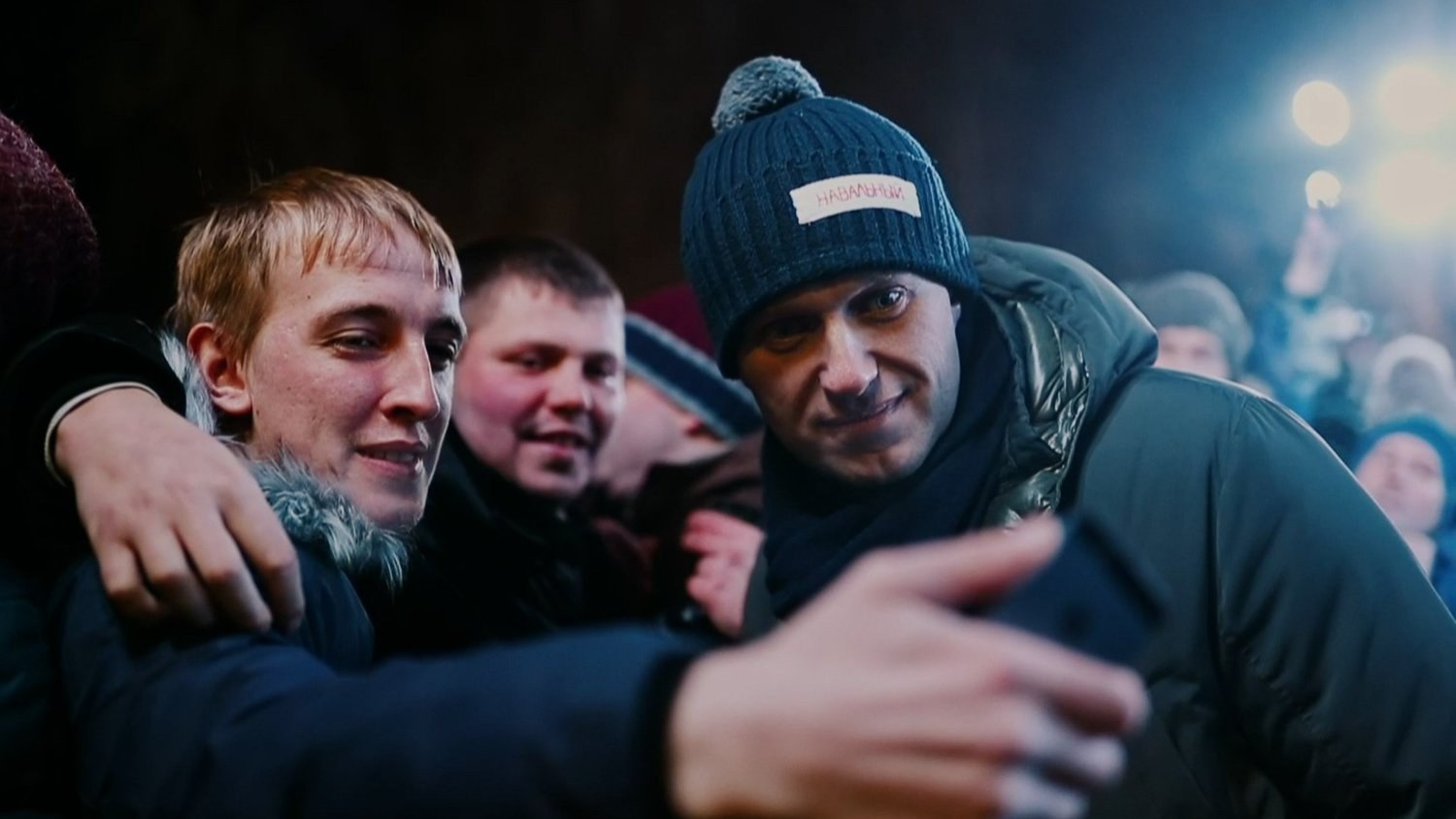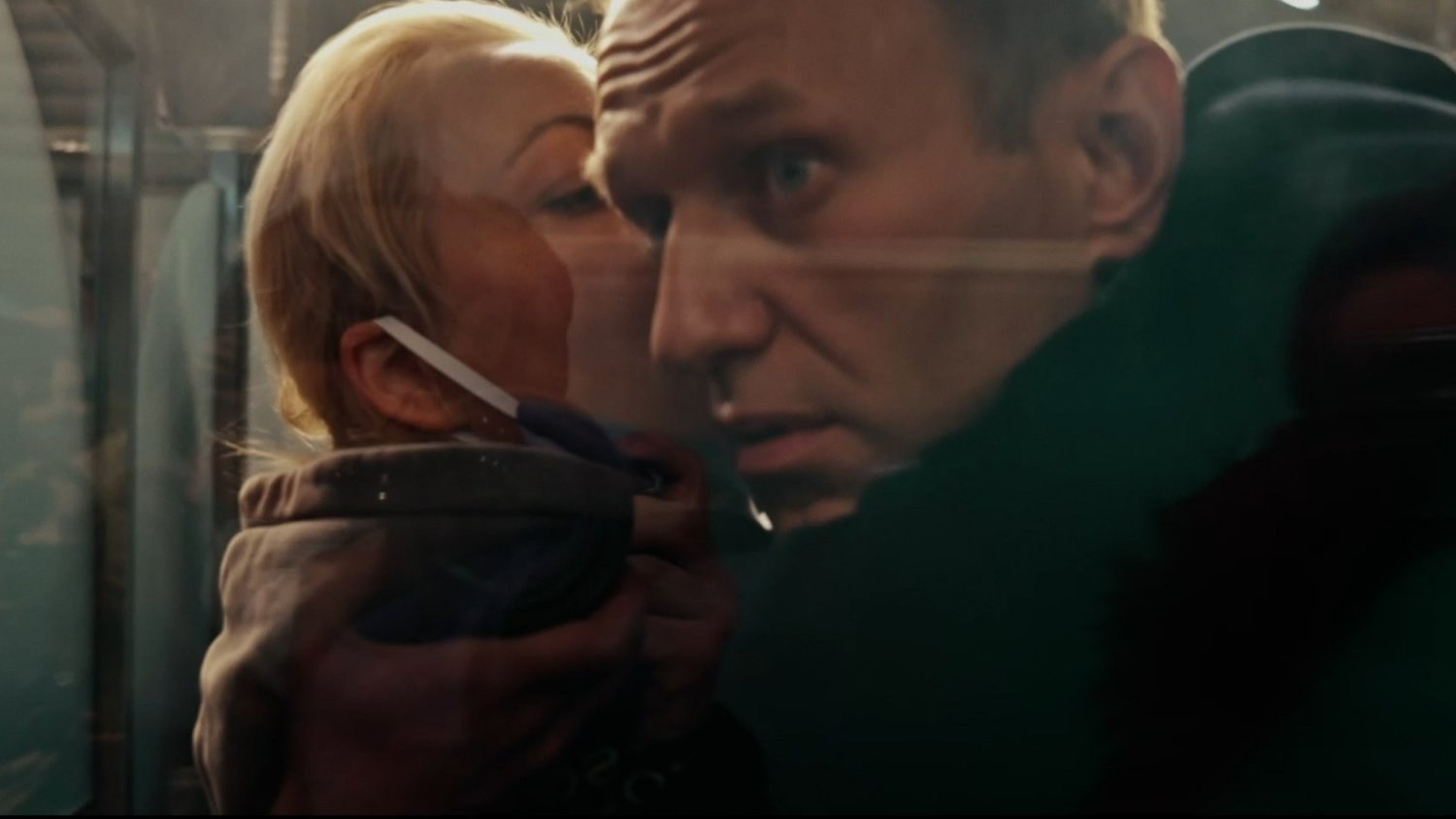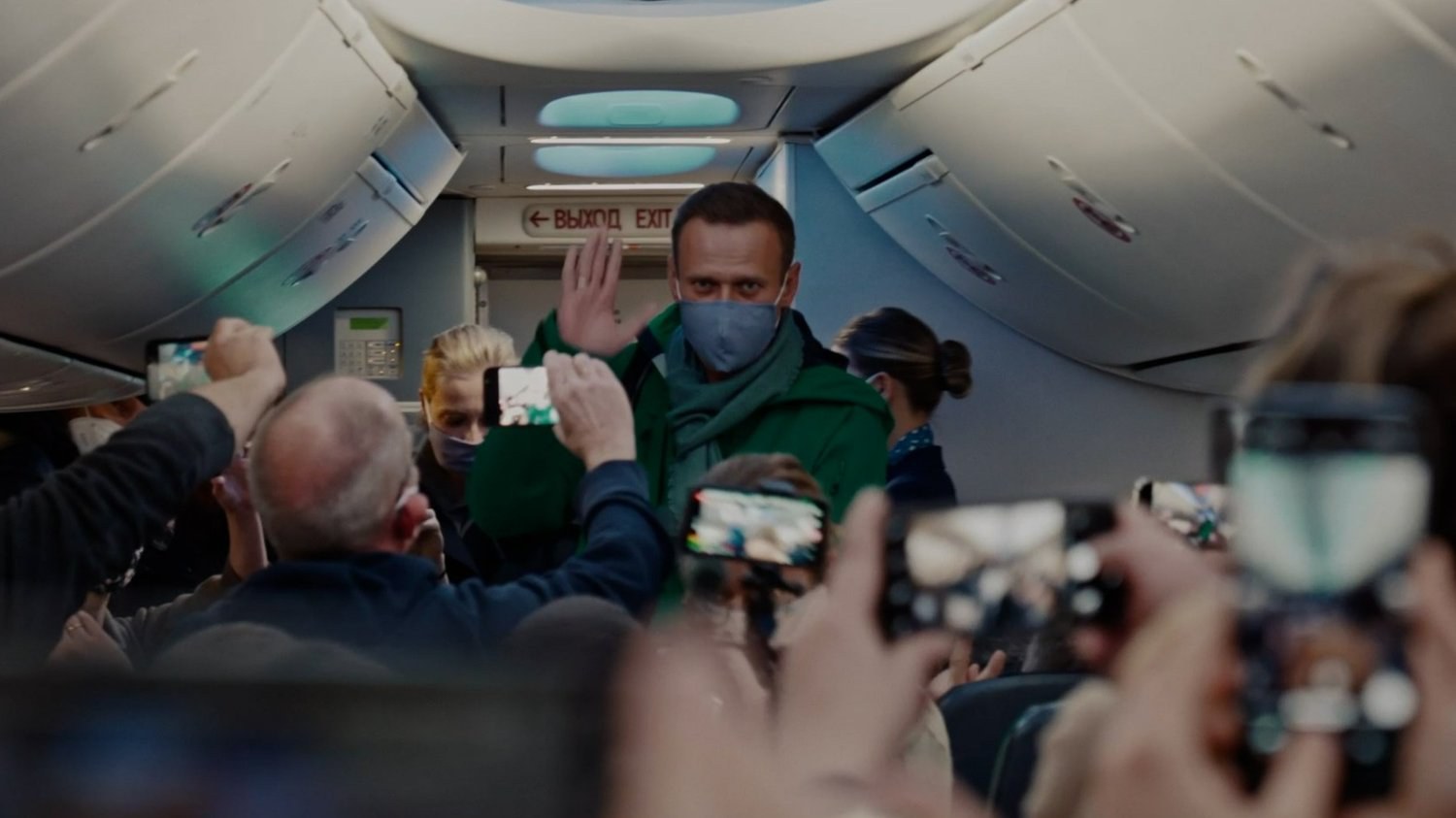On this encore episode, director Daniel Roher and investigative journalist Christo Grozev discuss how they made “Navalny,” which went on to win the Academy award for Best Documentary Feature, following the interview’s original airing in March.
Before jumping into making the Oscar-nominated “Navalny,” Daniel Roher was harnessing his skills while creating short docs such as “Sourtoe: The Story of the Sorry Cannibal,” and “Finding Fukue.” Most recently he directed the feature documentary film about the 1960s Canadian-American rock group "The Band,” in “Once Were Brothers: Robbie Robertson & The Band.”
So, when the 30-year old Canadian filmmaker embarked on making a film about Russian opposition leader Alexei Navalny, he didn’t know what he and his team were getting into.
“When it comes to the personal risk, I think that I was being guided by a deep well of naivete,” he reflects.
Bulgarian journalist Christo Grozev, however, was much more attuned to the threats of pursuing Navalny’s story. Grozev is an investigator focusing on security threats, extraterritorial clandestine operations, and the weaponization of information with Bellingcat, a group that specializes in fact-checking and open-source intelligence. One story he covered was the downing of Malaysia Airlines Flight 17 in 2014, in which he helped identify two senior Russian officers linked to the attack, an investigation he says, that put him “on the spot of interest of Russian intelligence services.”
In 2016, after completing a journalists training in Russia – something he did every Spring since the early 2000s – he was told he could never return and his visa was canceled.
“I knew that they had noticed me. I knew that there was an abstract interest in me, and that I was deemed to be [an] undesirable character,” he says. “But I never felt it as something directly threatening my life. And that actually changed in the last year.”
In late 2022, Russia’s Ministry of Internal Affairs placed Grozev on its “wanted” list, which means a criminal case was opened against him for “spreading fake news,” according to the Russian state-owned news agency RIA Novosti.
Finding a new story
In October 2020, Roher was working on a film in Kiev, which the Ukrainian government “was not particularly thrilled that we were pursuing,” resulting in he and his team being asked to leave the country. They left for Vienna, Austria, to figure out what to do next.
“I didn't have a film to make, which meant I was unemployed and I was getting very anxious,” Roher recalls.
That’s when Grozev told Roher he had an investigative piece about Navalny and a lead on who tried to poison the Russian politician, so that could potentially make into an interesting film.
“Immediately it was like a light bulb went off above my head,” says Roher “and I understood that that was where we should orient our efforts and our focus.”
The film “Navalny” follows the lawyer and anti-corruption activist’s political rise in Russia, the attempted assassination on his life, and his search to uncover the truth.
Investigating nerve agents
In 2018, Grozev and Bellingcat uncovered that Russian operatives had used a specific strain of the Novichok nerve agent to poison Sergei Skripal - a former Russian military officer and double agent for the British intelligence agencies – and his daughter, Yulia, in the United Kingdom.
Two years later, an upgraded version was used on Navalny. “That led to a whole Pandora's box of further findings that other opposition figures could also have been targeted by Putin,” he explains.
Through Bellingcat and Grozev’s investigations, they also discovered that not only Russia manufactured Novichok - despite being a signatory of 1993’s The Chemical Weapons Convention, which prohibits the development, production, stockpiling and use of chemical weapons - it was also actively pursuing a research and development program to make better versions of the nerve agent.
Even though most Russian journalists believed the Kremlin had poisoned Navalny, Grozev says “the expectation was that this would not be easy to crack” because the crime had happened on Russian soil and the Russian Federal Security Services was believed to have covered it up.
So, how were they able to connect Skripal and Navalny’s cases? Grozev observes that they started looking into the scientists who had developed the poison, and from there, “we got to the people that actually provided the poison for the attempted assassination of Alexei.”
Meeting Navalny in Germany
Once Navalny was poisoned, he was medically evacuated to Berlin in August 2020. There, he was placed in an induced coma, but by September, he was released to rehabilitate in a “bucolic little village in the Black Forest,” Roher says, where the population likely doubled because of Navalny’s security detail.
After talking with Roher, Grozev had to establish contact with Navalny. They had followed each other for years on Twitter, a space where they “bickered” and “disagreed on many things,” he notes. They never met, “but were aware of each other.”
The journalist sent Navalny a direct message on Twitter saying he may have found the person who poisoned him. Navalny immediately responded and said they should meet. They connected and talked via Zoom about the film and of getting together in Germany the following day.
“Driving across Germany and Austria had this exciting feeling as if we were entering into our own little spy film. That's how it felt,” the filmmaker recalls.
Navanly, however, was hesitant about Roher’s filming crew at first, agreeing to see Grozev alone to talk about it because he was thinking about making his own film.
At their first encounter, Grozev says he had two goals: to finish his investigation into Navalny’s poisoning – as he needed his help with data about his travel, hotel stays, etc. – and he also “had this tag-on project,” or the film.
“I had to be careful to not have one of these agendas cannibalize the other,” he affirms.
Grozev went to Navalny’s apartment. While Navalny looked through the journalist’s computer to make sure he was not “a CIA spy,” Roher drove around with producer Odessa Rae “listening to crappy 80s music” in the only radio station in the German village, “waiting to be summoned back.” Grozev eventually called them to join him and Navalny.
“I had the opportunity to essentially pitch the leader of the Russian opposition on a film project, [and] not just my vision for the film, but also why we should do a film,” Roher recalls. “Thankfully, in that pitch, I was successful.”
Roher explains that Navalny ended up being “very curious and interested to be a film subject” and his resolve made the production easier, and they started shooting almost immediately.
“Once we found Navalvy and we sat across from him, I think his courage, and his bravery sort of proliferate[d] over the rest of us,” he states. “We knew immediately, as soon as we sat down with this guy, how extraordinary he was.”

Alexei Navalny (right) takes a selfie with supporters. Photo courtesy of CNN Films.
Maintaining scrutiny
Roher quickly realized how “charming, funny and interesting,” Navalny was. They had “a shared sense of humor,” and “in no time, we were taking the piss out of one another,” and politics. But the filmmaker needed to keep his guard up.
Making a film about a politician seeking the presidency of “the biggest country in the world… demanded of us to maintain scrutiny,” he explains. “I could not lose the sense of skepticism that I had towards him even though I liked the guy personally.”
At their first meeting, Roher explained to Navalny that he would only make the film if he could challenge him, and that his “highest allegiance” was to the film.
“I think he understood that,” he adds.
Grozev, however, admits that when he saw Roher’s pitch, he became concerned.
“[Roher] is much younger and much less aware of Russian realities than the subject of the film, so I was afraid that he might be either instrumentalized or overwhelmed,” Grozev recalls.
It soon became clear to Grozev at “late night quarrels over dinner” that the differences of political opinion and disagreement between Navalny and Roher on “basically everything” was great.
“[Roher] is brusque, and he's very direct when he's challenging somebody, [so] I got comfort that this is not going to be a falling in love situation within a couple of days,” he explains.
Pulling the tiger’s tail
As the film progressed, Navalny prank called a Russian scientist in Grozev’s list to talk about his possible involvement in planning and executing his poisoning. The plan worked, and the scientist “spill[ed] the beans.”
In the meantime, while Bellingcat held the phone call to verify other names the scientist provided, Putin gave an annual press conference where, when asked, he admitted Navalny had been tailed because he was a traitor.
Bellingcat published the phone call just days later.
“We embarrassed Putin because that phone call literally defied everything that Putin had said the previous day: No, it wasn't political surveillance. It was an assassination attempt by the people he admitted had been following Navalvy,” Grozev notes. “So I think at that point, it became clear that somebody who embarrasses Putin, puts him on the spot in front of the whole nation, is certainly in danger.”

Alexei Navalny’s wife, Yulia, kisses him on the cheek. Photo courtesy of CNN Films.
Navalny returns to Russia
Throughout the film, Navalny was determined to return home. While Roher admits he felt conflicted about it, he didn’t feel comfortable questioning Navalny because from the moment they met, it was clear “there was no dissuading him.”
“Alexei, going back to Russia was as concrete as seeing the sunrise when you wake up in the morning,” Roher says. “It was just something that was going to happen, that he was going to make sure happened.”
Grozev took a different approach. He talked with Navalny’s wife, Yulia, about the risks he was facing, including arrest and long-term imprisonment. She answered that was the only way Navalny could be a politician, close to his electorate.
“There's some sort of degree of Russian martyrdom that is not native to many of us,” Grozev explains, “and some political martyrdom that actually sets politicians [who] change their countries apart from anyone else.”
In hindsight, Roher thinks of Navalny’s savior complex as an undeniable force of courage and moral clarity.
“He wanted to be the moral leader of the nation, and that meant showing the rest of the country how to be brave, and that meant going back,” he says. “He was doing this for him, democracy, his children and the future of his country.”
Keeping Navalny alive
Navalny went back to Russia in January 2021, and was immediately detained. A month later, he was sentenced to two and a half years in prison on charges of violating parole conditions of a 2014 conviction. Then, in 2022, he faced a new trial for embezzlement and contempt of court and was found guilty. He was sentenced to an additional nine years in a high-security prison.
While Roher feels guilt about Navalny “being in a very small solitary confinement cell in a gulag” outside of Moscow, he credits the film’s success to the opposition leader, and hopes to one day show him the film.
“My dream is for a future where Putin is gone… and I can travel to Moscow, rent out a cinema, sit next to Alexei and show him the film,” Roher chokes up. “That's something that would mean a lot to me.”
The film has helped keep Navalny alive, says Roher.
“By bearing witness and filming and making this documentary, we have achieved so much towards keeping his name in the global consciousness,” the filmmaker says, “and that really matters.”
Grozev agrees, and adds that he’s “optimistic about Navalvy surviving.” He attributes this as a safety mechanism caused by Putin’s miscalculations of entering a war in Ukraine that he can not win, thus facing doubts at home of his “longevity, both physical and political,” and the fact that Navalny became more valuable by being kept alive.

Alexei Navalny is photographed by fellow passengers on a flight to Moscow. Photo courtesy of CNN Films.
Finding a backer
The film was initially financed by Roher, Grozev, and his producer Rae, but they were confident in the film’s success.
“We [had] so much faith in what we [were] doing. We knew that this was such an extraordinary story that it was lightning in a bottle that we took that risk,” he says.
“Navalny” has won 14 awards, including a BAFTA for Best Documentary, and is competing for an Academy Award for Best Documentary Feature.
Then, Roher and his team encountered another challenge: finding a partner to work with. He says they thought “quite naively” that they would “waltz [the film] into one of the major streamers, who would see this for what it is, [and] would, of course, want to work on this film.”
They quickly realized that there was a fear of taking on the Kremlin and Putin’s regime. “We needed to find the right partners, an organization that had the sort of chutzpah and courage to walk to the fire with us,” he explains.
They eventually partnered with CNN Films, CNN’s documentary film unit, which announced, since the film was released, that it is scaling back on original content from outside partners.
“It's a deep tragedy,” Roher reflects. “There were not too many places, there were not too many executives who had the courage to take on a project like this. I think it's a tremendous loss for investigative-base nonfiction, filmmaking, nonfiction cinema, to lose CNN Films, and we still don't know who is going to pick up the slack that has been dropped.”
Releasing the film
“Navalny” premiered on January 25, 2022 at the Sundance Film Festival. Then, in April, Roher says they felt compelled to drop the film because of the Russo-Ukrainian War that began in February.
“We understood that we had to get the film out as quickly as possible, because we were afraid that the regime would just rip off the band aid and kill all of the oppositionists,” he says. “We abandoned our carefully calibrated Summer release schedule, and instead opted for a more guerrilla, running gun, get this thing out in the world approach, which was important for our political mission.”
“Navalny” is now streaming on HBO Max.
